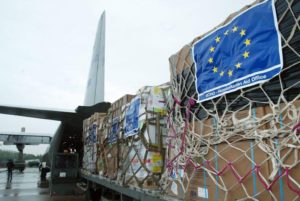European Parliament Questioned again on Diversion of EU Aid by Polisario
 The Spanish NGO Canario-Sahrawi Forum (FOCASA) has recently questioned the European Parliament on the massive embezzlement by the Polisario of the European Union’s humanitarian aid to the Sahrawi people in the Tindouf camps in Algeria. The embezzlement was documented in several damning reports, including a report by the European anti-Fraud Office (OLAF.)
The Spanish NGO Canario-Sahrawi Forum (FOCASA) has recently questioned the European Parliament on the massive embezzlement by the Polisario of the European Union’s humanitarian aid to the Sahrawi people in the Tindouf camps in Algeria. The embezzlement was documented in several damning reports, including a report by the European anti-Fraud Office (OLAF.)
Following an investigation conducted in 2005 in Algeria, the World Food Program (WFP) had also decided, as the UNHCR had did before, to readjust its help, which was previously based on incorrect estimates of the number of the Tindouf camps residents.
In a letter to the Chairperson of the EP Committee on Budgetary Control, FOCASA urged the European Parliament to make of the census of the Tindouf camps’ populations a prerequisite for granting new European aid.
For the Spanish NGO, it is “both a requirement of common sense” and “a moral obligation vis-à-vis these defenseless populations,” which receive only the leftovers of the humanitarian assistance, while the greatest part of the aid is diverted along the way, to be sold in black markets in Algeria and neighboring countries.
As OLAF had underlined before, FOCASA also stated that the absence of a census of these populations was and still is the main cause of the massive diversions. The diversions allowed the Polisario leaders and notables as well as some Algerian officials to get rich illegally and to purchase property and build secret bank accounts in Europe with the misappropriated funds.
The European Union, which is one of the largest providers of aid to the Tindouf camps populations, must require the identification of refugees to adapt assistance to their number and thus reduce the risk of diversion.
The OLAF report, released in 2015, shows that “laxity has permanently marked the support extended to these Sahrawi populations,” added FOCASA.
The Spanish NGO finally called the President of the Budgetary Control Committee of the European Parliament to raise again this sensitive issue at its plenary session on July 8, during which OLAF will be represented.

